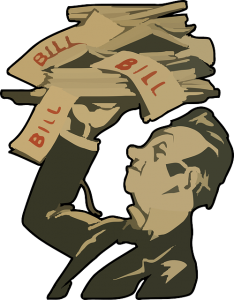Most adults have faced a financial emergency, when an unexpected event has broken their budget or spending plan into pieces. Sometimes more than one emergency has occurred in a short period of time, causing debt balances to spiral out of control.
Even in extreme circumstances, it is still possible to keep your personal finances under control. With some ingenuity and a little bit of work, you can start slashing loan balances while keeping your credit score protected.
What It Means to Negotiate Debt

If you are getting behind on your bills, you need to find a way to pay at least a portion of them on a regular basis. Negotiating with the creditor or service provider allows you to show that you are interested in paying your bills and are not just walking away from your obligations. In order to negotiate, you need to understand how the creditors look at what you owe. First, understand that your balance due is split into two parts:
- The Principal. This is be the amount you borrowed (for credit cards) or the amount of service used (for things like utilities).
- The Finance Charge. This is “everything else” that you get charged for – the interest fees, late charges, service charges, etc.
When you get behind on your bills, the finance charge is what will start growing out of control, especially on credit cards.
If you want to protect your credit rating, there is nothing that can be done about the principal for now. Debt negotiation focuses on lowering the finance charge and protecting your credit score. By working with your creditors, you may be able to get some of the late fees and interest charges reduced or removed from your total balance due.
To Err Is Human
Everyone falls behind on their bills at one point or another. Debt negotiation leverages this fact. If you call your creditor to explain the situation, the person speaking with you has likely been in your situation before, and he usually can offer you some breathing room.

Believe it or not, creditors like negotiating these finance charges. They prefer to be paid in full by the due date, but they would much rather hear from you and adjust some finance charges than to not get paid at all. Imagine if you loaned $20 to a friend, and that friend was not able to pay you back on the day you agreed. You would rather get a call or text from the friend explaining the situation than to have your friend start avoiding you.
Companies are the same way. If you are not able to pay your bill one month, they do not know if a payment is coming the next month or if you are on the verge of declaring bankruptcy. If they don’t hear from you and are forced to use a collection agency to collect their money from you, they will add on additional charges to cover their extra expenses. However, if you keep them in the loop on your financial situation, reassuring them that they will get paid, they will usually drop some or most of those extra charges. They would rather help you become current on your account than keep adding extra charges.
How to Negotiate
Debt negotiation is not the same as “debt settlement,” “debt consolidation,” or any other debt management service that you may have seen advertised. The process of negotiating your debt involves two basic steps.
Step One: Make Your Payment Plan
If you know you will be behind on your bills, develop a priority list. Decide who will get paid and it what order, how much you will pay, and when you will send your payment. Negotiating your debt means that you need to talk to each creditor directly. Every creditor you owe will want to be paid first, and you cannot promise that to everyone.
By having a strong plan, you will be able to tell your creditor what your situation is and when you expect they will be paid.
Step Two: Call Your Creditor

To rephrase, call each creditor as soon as possible. You need to be in contact with your creditors as soon as you know that you will not be able to pay the full amount by the due date. During this phone call is when you negotiate the finance payments.
Ideally you will call each creditor before the due date on your bill and especially before late charges are applied. The longer you wait to call, the less likely your negotiation will be successful. Also notice that the word is CALL. Do not consider email or live chat as the same thing. Remember, when a debt collector wants to put pressure on you to make a payment, your phone will be ringing. You want to put that same pressure on your creditor. It is much easier to tell you “no” by email than over the phone.
Step Three: Know What You Are Asking
When calling your creditor, you will need to be very clear on what you are asking for. You are not asking for a reduction in principal. You are asking for the late fees and extra interest payments to be deferred while you get money together. These are things that whoever you speak to, or his/her manager, can usually help you with.
When calling, use the term hardship, and ask if they have a hardship assistance program. Many larger creditors have a procedure in place specifically for hardship assistance, which includes waiving late fees and lowering interest payments.
Regardless of whether or not such a program exists, your main ammunition is your personal payment plan and the fact that the person on the other end of the line is human. Explain what caused your hardship and that you do have a plan to pay the debt. You absolutely should NOT get angry at them or try to fight their decision. If things are going poorly with one representative, you can try to call back and talk to someone else.
Benefits of Debt Negotiation
In the lesson on managing bills, we showed that getting one or two months behind on your bills can be addressed by putting off some bills until next month and paying the rest in full today. We also estimated that there would be some damage to our credit by doing this, and we would accrue late fees and interest charges.
In that scenario, no communication was made with the creditors. We just tried to see which bills had the highest fees and highest risks. We could potentially get our total loss much lower or even have zero loss if we simply reached out to those last remaining creditors and asked for a payment extension.
Lower Cost
The most obvious benefit of debt negotiation is pure cost. Removing your late fees and increased interest charged will reduce the total amount you need to pay off.
Cheap and Easy
Negotiating your debt takes some time and planning, but it can be accomplished with little more than a phone call. This makes debt negotiation by far the cheapest debt management solution out there.
Preserved Credit
Preserving your credit score is another huge bonus. Talking to your creditors means they are far less likely to mark you as delinquent on any payments, keeping negative marks off your credit score.
In the managing bills lesson where we paid off most of our bills and left others for next month, simply calling up our creditors and negotiating the late fees could have eliminated the problem entirely by cutting out the late fees and interest being charged.
The bottom line is that if you get behind on your bills, call your creditors as soon as possible. Even if you cannot pay a dime this month, simply opening the lines of communication will save you money in the long run.
Starting The Discussion
Watch this great video from Bank of America showing how to start the negotiation process with your creditors.

Get PersonalFinanceLab
This lesson is part of the PersonalFinanceLab curriculum library. Schools with a PersonalFinanceLab.com site license can get this lesson, plus our full library of 300 others, along with our budgeting game, stock game, and automatically-graded assessments for their classroom - complete with LMS integration and rostering support!
Learn More[qsm quiz=139]
Challenge Questions
- Why might a company be interested in negotiating your debt with you?
- Using an example, explain what is the difference between principal and interest?
- How might the interest on the same loan vary from person to person?
- How does debt negotiation benefit you?
- How can debt negotiation go against you in the future?
